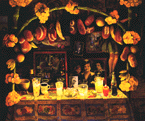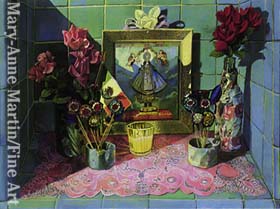Elena Climent
In Search of the Present
|
 |
|
In Search of the Present
Elena Climent
|
|
| | page 1 | page 2 |
page 3 | page 4 | page 5 |
|
|
O
NE OF THE MOST difficult challenges in my life has been trying to bring
together with some common denominator my different backgrounds and the
contradictions they produced in my upbringing.
My father was a Spanish
artist and an exile from the Spanish Civil War. In 1939 he sailed to Mexico
with many others who, like him, were fleeing the new fascist government in
Spain. He never saw his parents again, and he saw his siblings only after
some 30 years. In Mexico he had to begin a whole new life for himself. He
was then 42 years old.
I think that after his first years in Mexico, once the
fascination and surprise of this new vast and marvelous country had calmed
down, his nostalgia for the world he left behind settled in him forever.

Altar with Blue Tiles, 1992
|
All throughout the rest of his life-his second life one may call it-he
surrounded himself with a universe of his creation, impregnated with
fantasies and painful recollections of that lost world which became more
and more legendary: the Mediterranean world which he evoked in his
surroundings, in his home and in his art. He painted, over and over, his
dreams of his Spanish memories, the even-more-remote dreams of other
dreams, Spanish dreams, memories from the times of the Arabs, of the times
of Mediterranean splendors, a fascination for whichever trace was left of all
those long-gone people who travelled from one coast to another selling,
buying, trading. Who exactly they were didn't matter, what
mattered was the feeling, the flavor, the atmosphere that all that
long-time-ago memory was wrapped in and, above all, his love for it and the
great pain for its loss.
He painted mostly objects, and when they weren't
objects, when they were people or landscapes, he treated them as if they too
were objects: ancestral, timeless, immortal, silent and full of secrets never
to be known. His objects made you think of those you could find in a burial or
in some distant market, at a stand where they sold antiques that have
travelled through places and times, no one knows how long or how much,
until they arrived at that very place and into your own hands by pure chance.
|
| continued |
|






|











